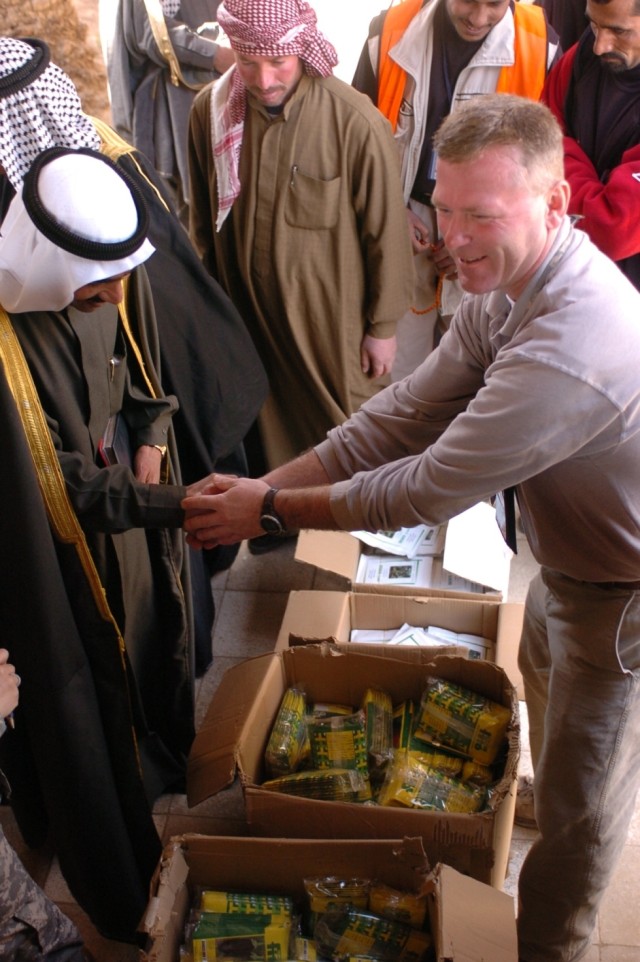FORWARD OPERATING BASE KALSU, Iraq (Army News Service, June 2, 2008) - After nearly a year in Iraq as the last of the "surge brigades," the 2nd Brigade Combat Team, 3rd Infantry Division, has seen the south-Baghdad area transformed from insurgent stronghold to model of peace and security.
The gains made in security may not hold, however, unless citizens of this area are able to successfully continue their way of life, according to 2nd BCT leaders. In the 2nd BCT's area of operations, that mostly means agriculture.
<b>Food Shortages</b>
"If you feed the people, they can concentrate on their other needs, and thus it becomes a more peaceful area," said Mike Stevens, a representative of the U.S. Department of Agriculture and agriculture adviser for the U.S. State Department's Baghdad-7 Provincial Reconstruction Team, noting that when he arrived in October 2007 it was only safe to travel in five percent of their area.
Years of war had ravaged the farming sector, with decreased supply driving market prices up. Already a net importer of other food products, Iraq relied on imports of produce to meet people's needs.
"It was horrible when I first got here. Traveling through Amman, (Jordan) telling people what I do, they pleaded with me to do something about the food situation in Iraq, because prices had been through the roof," Stevens said, adding that arms were often smuggled in with the imported vegetables.
<b>More Food Equals Fewer IEDs</b>
"As we focused on seed distributions, it got farmers farming, rather than putting (improvised explosive devices) on the road. It was a kind of domino effect. Wherever we did these distributions we saw a decrease in IED activity and an increase in farming," he continued, crediting 2nd BCT Soldiers with the hard work of patrolling and identifying key figures and their needs.
<b>Soldiers' Assistance</b>
Soldiers flooded the area with tomato, green pepper, eggplant and cucumber seeds. They also gave out plastic, used to make shelters which trap moisture in the warm, arid climate. Their efforts, according to Stevens, are already producing results - he said these products have all recently dropped in price by 25 percent.
"They had everything to do with revitalization in the agricultural sector," he said. "I can attend the farmers union meetings, but I am not the guy out talking to the farmers ...They are the ones who identify all the crops being grown in the area. They are the ones who see that the seeds are getting distributed properly. They are the ones who are implementing the programs."
Similar kick-start programs were also begun with poultry and fish farming. So far, $75,000 from the 2nd BCT's Commander's Emergency Response Program have been spent restocking fish and poultry farms and more than $73,000 of State Department quick reaction funds have been spent on poultry farms.
Other programs have been aimed at assisting farmers in other areas of farming, including $20,000 in QRF for flooding orchards, $8,500 in QRF for beekeeping supplies and $50,000 for repairing irrigation canals and pumps. In addition, $180,000 in CERP funds have been allocated to provide veterinary services for livestock.
<b>Farmers Unions</b>
There are currently seven farmers unions in the 2nd BCT's area. The goal is to establish the unions as non-governmental organizations which can generate profits, said Capt. Jeffrey Brizek, deputy agricultural adviser to the Baghdad-7 ePRT.
"We are working toward improving the farmers unions so they can develop business opportunities within their specific areas," he said. "Then they can be profit-generating organizations and sustain themselves."
For example, farmers unions in South Rasheed and Arab Jabour recently purchased nine tractors with loans from the Iraqi Ministry of Agriculture. They will be rented out to farmers in order to generate revenue for the unions. Brizek called this proof that the Iraqi government is becoming a more direct force with the local populace.
<b>Providing for the Future</b>
Stevens stressed that the joint mission of the 2nd BCT and Baghdad-7 ePRT is more than just providing short-term assistance to farmers. Farmers are being encouraged to take agribusiness training and work with their local farmer's unions. Representatives from all of the unions are also attending seminars and some will take advanced agribusiness classes.
"It's getting them thinking about the big picture, rather than just initial handouts like they've been used to for so many years," Stevens said. "One farmer who has been to the training told us, 'You've brought us out of the dark'. That light is starting to come on. Those trains of thought are going to make good businessmen out of these farmers."
Brizek said there are several ways to measure the 2nd BCT and ePRT's success in the past year with local farmers, from increased production to greater independence and involvement in their government, and Stevens added that the ePRT's future mission is as an advisor, letting Iraqi farmers work directly with their government.
"The first thing is putting food on the table," Brizek said. "We've seen at least a 25 percent increase in crop production. You're seeing farmers re-developing their industries. They've gotten a lot of support through their farmer's unions and they've got a voice in their government now. They're working to make their voices heard."
(Sgt. David Turner serves with the 2nd BCT, 3rd Inf. Div., Public Affairs Office.)


Social Sharing